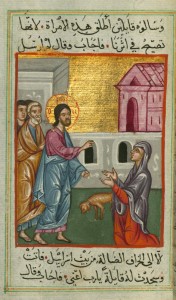Thoughts on Today’s Lessons for Sunday, Aug. 17, 2014

The Canaanite woman asks for healing for her daughter. Ilyas Basim Khuri Bazzi Rahib, a Coptic monk, Egypt. 1684.
Joseph has been through a lot since last week’s reading, when we saw his jealous brothers sell him into slavery. He went to Egypt, did well, fell from grace, was sent to prison on a false charge, but bounced back to become Pharaoh’s chief governor. Now his brothers have come to Egypt fleeing famine, and they’ve encountered Joseph. As you can imagine, they fear his revenge! But Joseph forgives them, just as God has forgiven the wrongs of Abraham, Isaac and Jacob; and the ancestral line of the Bible’s patriarchs will live on.
Psalm (Page 787, BCP): Psalm 133
The Psalmist exults in the blessedness of unity in this short, ancient hymn of praise. As Joseph’s family came back together in love, and as Paul will urge the Christian community of Rome to come together in friendship, it is good and pleasant when families and friends live together in blessed unity.
Second Reading: Romans 11:1-2a, 29-32
Continuing his exhortation to Rome’s Jewish Christian and Gentile Christian communities to get along, Paul points up his own Jewish heritage, placing himself in Abraham’s direct line as a descendant of Benjamin, the youngest of Joseph’s brothers, whom Joseph loved. Paul assures us that God’s promises to Israel and to the Gentiles are equally irrevocable, regardless of our disobedience. We all earn God’s love, regardless of our sins, regardless of our ancestry. God is merciful to all.
Gospel: Matthew 15:10-28
We get not just one but two Gospel stories this week, perhaps told by Matthew as a way to emphasize that Jesus’ way is not only for Jews but Gentiles as well. First, Jesus mocks a group of Pharisees who had challenged his disciples for ignoring ritual traditions. He speaks a blunt and rather earthy criticism: Neglecting to wash our hands before eating doesn’t defile us, but the words that come out of our mouths may do so. Then, Jesus surprises us again with a burning insult for a Canaanite woman who sought help for her daughter, likening them to stray dogs scrounging for crumbs. Really, Jesus? Really? But the words from the mother’s mouth clearly come out of her heart. Jesus is changed by the encounter. He praises her faith and heals her child.
